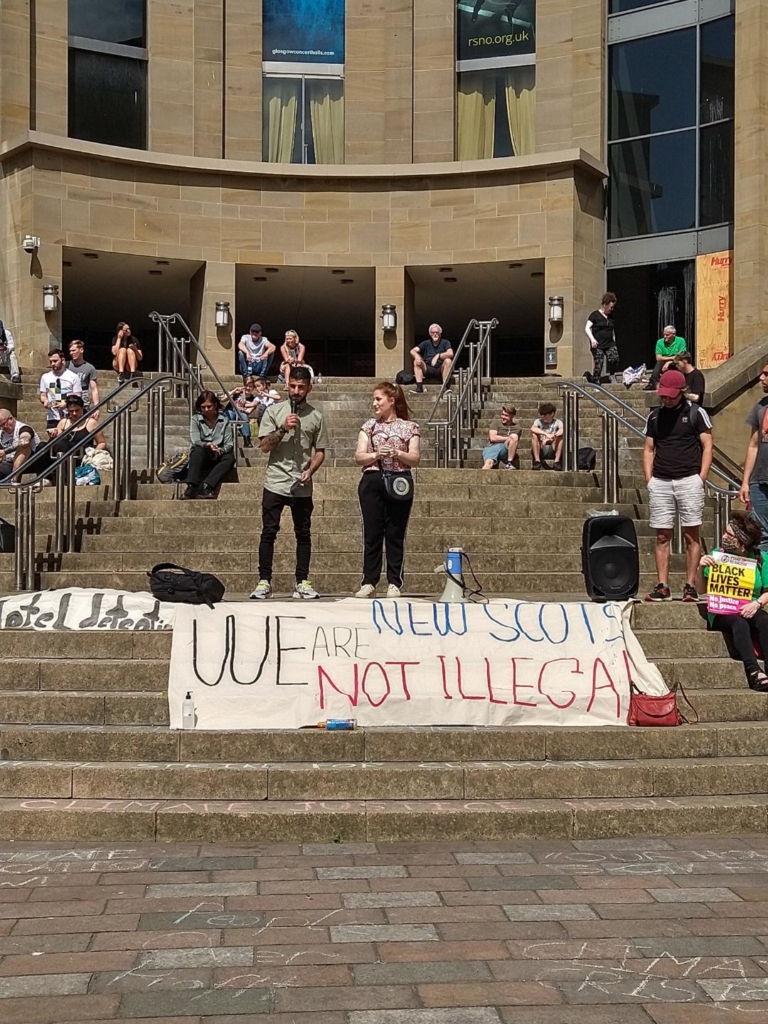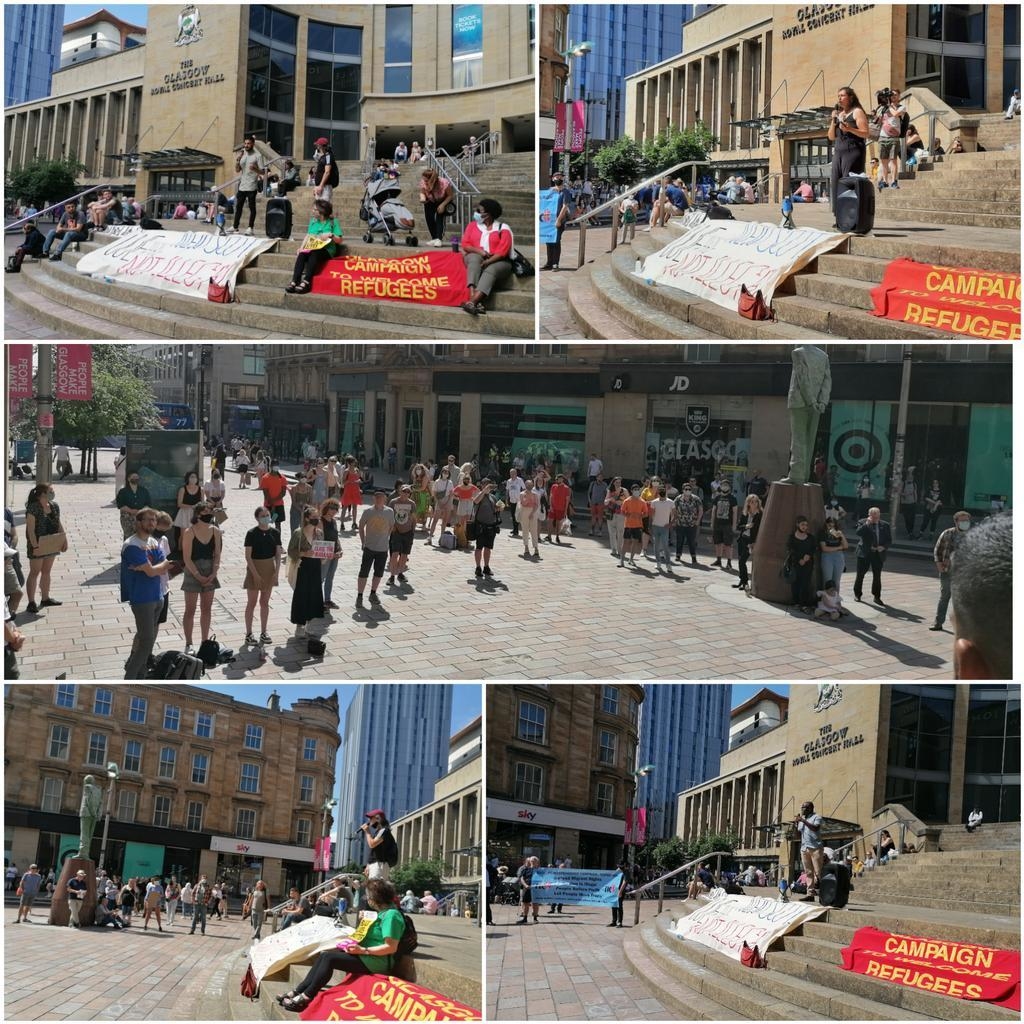How the No Evictions Network is fighting the Nationality and Borders Bill

Standing on the steps of Buchanan Street in Glasgow, Lana, who first arrived in Scotland as an asylum seeker, said: “if someone is not desperate, why on earth would they ever risk their three-year-old child’s life in the ocean? We left our country because there were no human rights, and after taking so much risk and arriving here, now this Bill will again take our human rights away from us”.
Last Saturday, she was one of the speakers at a protest against the Nationality and Borders Bill organised by the No Evictions Network in Glasgow.
The No Evictions Network has been central to vital community organising, especially over the past few months. From campaigning for asylum seekers’ housing rights to playing a crucial role in resisting the deportation of two locals at Kenmure Street in May, the Network’s activity reflects the kind of Scotland many residents hope is in our future. Most recently, they have been working to fight Priti Patel’s proposed new “Nationality and Borders Bill” that would impose draconian immigration rules.
The Nationality and Borders Bill (see here for an explainer by Minni Rahman for gal-dem), which will receive its second reading in the house of Commons on Monday 19th July, has received heavy criticism from activists for its criminalisation of refugees and asylum seekers. No Evictions highlight that “The UK signed up to the 1951 Refugee Convention, which gives a strong legal basis to claim asylum” — a commitment that this bill fails to uphold.
The UN Refugee Agency describes the 1951 Refugee Convention as centred on the principle “that a refugee should not be returned to a country where they face serious threats to their life or freedom. This is now considered a rule of customary international law.”
They also highlight that a refugee has:
- The right not to be expelled, except under certain, strictly defined conditions (Article 32);
- The right not to be punished for illegal entry into the territory of a contracting State (Article31);
- The right to work (Articles 17 to 19)
- The right to housing (Article 21)
- The right to education (Article 22)
- The right to public relief and assistance (Article 23)
- The right to access the courts (Article 16)
- The right to freedom of movement within the territory (Article 26)
- The right to be issued identity and travel documents (Articles 27 and 28).
Conversely, No Evictions point out that the N&B Bill could refuse asylum seekers entry to the UK if they have not gained prior permission to enter– a process that is extremely difficult for those facing urgent and immediate danger– even criminalising them and sentencing them to anything between six months and four years in prison. It would also limit their right to appeal or challenge a court decision. Furthermore, it would limit their rights to access public benefits by imposing ‘no recourse to public funds’ and put an end to family reunification for those coming to the UK through other countries. By criminalising asylum seekers, the Bill would push many to seek more dangerous channels of entry to the UK, thereby putting their lives at increased risk.

In response to this Bill, the No Evictions Network, which is run by people with first hand experience of the asylum system, has been organising for a community and governmental response from Scotland. Initially, they released a statement condemning the Bill, explaining its violation of human rights, noting that “crossing borders is not a criminal offence” and highlighting the lack of a safe route for asylum seekers to enter the UK. They also note plans to hold refugees in “concentration camps” abroad– they are referring here to the part of the Bill that enables the Home Office to send asylum seekers to offshore centres– removing them from any possible integration into a community and keeping their living conditions out of sight from the general public. Finally, they put forward demands asking for clarification of the relationship of the Bill to the 1951 Refugee Convention, details of how much enacting the Bill will cost taxpayers, an estimate of the number of asylum seekers that will be jailed as a result, a commitment to introducing safe routes for asylum seekers, and abandoning any part of the Bill found to be unlawful or unsafe.
Later, they released a petition open to the community and local organisations to demand that government representatives take a firm stance against the bill, stating:
“We have had enough with the sound bites, and the gestures of welcoming refugees. As a dispersal city First Minister, MPs, MSPs and this devolved government needs to take more direct action, and to take more responsibility as the lives of vulnerable people are at further risk… We need our political representatives to stand up for the principle of refugee protection for everyone seeking asylum in the UK. It is vital that all the Glasgow MPs take a firm stand, and strongly oppose every stage of the Nationality and Borders Bill when the Second Reading takes place.”
They plan to present this petition to both the Scottish and UK governments.
On Saturday the 17th of July, they organised a protest on the Buchanan Street steps in Glasgow. Here, the community gathered to listen to speeches from supporting organisations and members of the No Evictions Network, including a twelve-year-old refugee. The speakers emphasised that those who take already dangerous routes to enter the UK do so because their lives depend on it. MP Chris Stephens also spoke, stating his commitment to keep fighting this Bill and asking fellow Glaswegians to do the same as “it’s not what Scotland stands for”.
No Evictions say that the community response has been very supportive. Savan Nielson, a member of the network, says his inbox has been flooded with messages from people in Scotland that have encouraged him to keep fighting, emphasising the value of the work they’re doing and the belief that “if you live in Scotland you are Scottish”. They plan to keep campaigning and holding rallies. To get involved or find out more details, follow the No Evictions Network on Facebook, Twitter, or Instagram.

If they are waiting on a response from the SNP and its leader, then they will be told, “No the Noo!”
Haven’t they heard? There’s a pandemic on the go and Nicola and her pals are too busy with that at the moment.
Back burner stuff, though it shouldn’t be.
Surely we can offer friendship and support to people who come here to live ,are willing to work and make a life for themselves and their loved ones, nearly everyone needs a leg up and support of some kind in their lives ,I say let’s give it to them.
“if you live in Scotland you are Scottish”
Like it.
Yep, it’s as good a definition of ‘Scottish’ as any.
https://www.msn.com/en-gb/news/uknews/ministers-under-fire-over-69p-a-minute-helpline-for-eu-citizens/ar-AAMk2gB
Feel the love.
Priti Patel was sacked from her job as international development secretary for committing de facto treason with Israel, and should have been expelled from the UK if they’d have taken her. Not only has Patel put national security at risk, but is a major threat to the rule of law and therefore public order. All of this is inter-related: the ancient UK treason legislation that protects the organized crime family ruling the British Empire, the subject status of its population, the imperial view that outsiders (such as refugees) are by default enemies conquered or yet to be conquered. That Patel does not have the public interest at heart should be evident from the Home Secretary’s war on investigative journalism and whistleblowing: https://www.theguardian.com/commentisfree/2021/jul/20/proposed-secrecy-law-journalism-spying-home-office-public-interest-whistleblowing
However, relentless depictions of border-crossers as ‘not illegal’ in general does not reflect the specific cases where the UK (as, for example, an international hub for mercenaries) has bad form, not least in sending covert special forces abroad to fight undeclared wars, or train the military of vicious and oppressive states here and send them back to commit war crimes, and so forth. Would anyone be surprised if the British secret services infiltrated other countries in the guise of refugees or aid workers to commit crimes abroad? And as Scotland warms to the temperature of the Costa del Crime, who can say if organized crime might consider relocating its summer camps here?
If Scotland does not have effective border controls that can identify and apprehend actual criminals and wrongdoers, rather than refugees, then it lets the rest of the world down. That the British Empire is in essence a criminal enterprise does complicate matters somewhat, though.
Good post SD.
It was good to hear Joanna Cherry point out today that the immigrants were often fleeing conflicts the “UK” helped cause.
@Tom Ultuous, indeed, and fleeing environmental degradation that the British have a hand in, whether generally through climate heating or specifically through things like dumping plastic waste and other toxic rubbish on their homelands.
There is a risk that the next ‘refugee’ that a public campaign sets out to protect will turn out be a trafficker or some other kind of criminal, which will be used to discredit the pro-refugee movement, whether as a deliberate set-up or opportunistically. It can be a great thing to help people in need. But vigilance is necessary. Meanwhile, real criminals, like oil sheikh pals of the Queen and Russian gangster-oligarchs are welcomed by this government as enthusiastically as Margaret Thatcher welcomed General Pinochet. https://www.independent.co.uk/voices/comment/tories-have-forgotten-thatcher-wasn-t-just-terrorist-sympathiser-close-friends-one-10507850.html
Good point SD. The media disproportionally highlight crimes committed by immigrants and if there’s a documentary about the housing crisis you’re guaranteed it will highlight an immigrant family living on benefits complaining about the (private housing) dump they’re living in.
It’s silly to say asylum seekers’ housing rights played a crucial role in resisting the deportation of two locals at Kenmure Street. Neither of them were asylum seekers. If anything, the Modi government in India is virulently pro-Hindu. So weirded was the rentamob that they thought that Sikhs do Ramadan ’cause they’re Muslims or something brain-dead.
However, I learned that:
– Dawn Raids are at 9am.
– They are advertised on Facebook. Possibly by politicians.
– The mighty protest resulted in the two Indian Uber drivers being detained and questioned at a police station about their expired visas, then released.
– I would imagine they will have to fill in the right paper-work, or be deported. They don’t even have to go to prison for breaking the law by being lazy or stupid.
– Their strange supporters aren’t lazy, but they are certainly stupid.
As people seem to be very confused, Sikhs have as much in common with Muslims as Catholics have with Zen Buddhists. Although that are allowed to carry swords on their persons on planes in India (but not a cigarette lighter).
Your first sentence here is utter rubbish – check your facts before you put your keyboard in gear .
Keep taking the pills.
A mere technical point, I know, but it’s not UTTER rubbish. They all have in common the fact that they’re social-cultural systems of prescribed behaviours and practices, morals, beliefs, worldviews, texts, sanctified places, prophecies, ethics, or organisations, that relate humanity to supernatural, transcendental, and/or spiritual elements. They all offer some sort of ultimacy and transcendence that provide authoritative norms and legitimise the power of their adherents over anyone who transgresses those norms. As such, they are all to be resisted, as are their secular analogues.
Just saying.
I can’t say that banning rented-home tenant evictions during the plague in Scotland did much of a job keeping up with the Tory party in London who were way quicker. Quite possibly because any Scottish campaigners were obsessed with asylum seekers rather than the other 99.9% of tenants. Or maybe because the SNP is way more beholden to property lobbyists than the Tories.